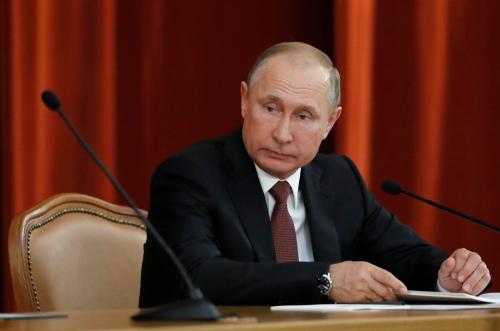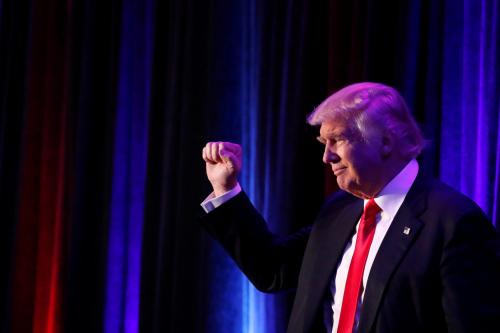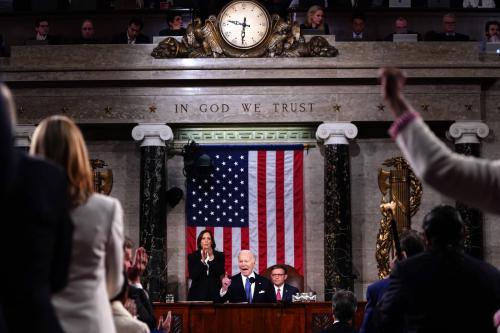It was only 30 minutes long and much of it was like playing tennis with a haystack, but last night’s Commander in Chief Forum with Donald Trump shed additional light on his foreign policy. It was particularly significant because Trump was relatively on-message for the last few weeks, and he’s been trying to pivot away from his more controversial comments of the past.
Here are three things you should take away from his remarks last night:
- Doubling down on Putin
Trump is accused of believing in nothing but he has been remarkably consistent on Vladimir Putin. He has every political incentive in the world to criticize Putin and Russia to protect himself from charges that he is an unwitting agent of the Kremlin. But, he refuses to do so. Trump insists he will get along with Putin, and the only thing he has ever suggested he wants from Russia is help on defeating ISIS. By this stage, he must have been briefed hundreds of times about Russian aggression in eastern Europe, but he has maintained a monkish silence about America’s allies. If he will not speak up for NATO during a political campaign when he has every political incentive to do so, he will not do so as president.
Trump also confirmed that he views all foreign relations as personal. He admires Putin as a leader. He cited his 82 percent approval rating (just wait until he sees Kim Jong-un’s) and dismissed the fact that he had invaded his neighbors (“do you want me to start naming some of the things that President Obama does?”). Trump insisted that the “fact that he calls me brilliant or whatever he calls me, he’s gonna have zero impact.” And yet, in the same breath he said: “If he says great things about me, I’m gonna say great things about him. I’ve already said he is really very much of a leader.” All of this will alarm U.S. allies and send a clear message that the way to get to Trump is to praise him personally. Of course, dictatorships will find this easier than democracies that have to justify such comments to their voters.
- Politicizing intelligence and the military
One of the most interesting but apparently least noticed moments of the evening came when Matt Lauer asked Trump whether his intelligence briefings had changed his views or perspective. Trump’s gut reaction was to politicize the intelligence. He did not learn anything, he said, that would cause him to reconsider his views, but what “I did learn is that our leadership, Barack Obama, did not follow what our experts” said to do. Of course, it is unlikely that professional briefers said anything of the kind. They are there to inform, not to recommend. What it did suggest is that Trump was very willing to twist intelligence to serve his political interests.
Trump proceeded to send an equally chilling message to the military. The generals “have been reduced to rubble,” he said. “They have been reduced to a point where it’s embarrassing for our country.” Then, a few minutes later, he remarked: “they’ll probably be different generals, to be honest with you. I mean, I’m looking at the generals. Today, you probably saw, I have a piece of paper here, I could show it, 88 generals and admirals endorsed me today.” The implication was clear: Personal fealty matters most. Say nice things about Trump, tell him he’s a genius, and get rewarded. Stay neutral or speak truth to power and pay a price. It is an incentive structure designed to suppress dissent from the outset. It will also encourage sycophants, and God knows Washington is not lacking in those.
All of this makes a constitutional crisis more likely. It’s hard to imagine the intelligence community or military standing by as Trump manipulates information for political purposes and purges senior officers without cause. Mass resignations, leaks, refusal to carry out illegal orders, and congressional investigations are all possible, even probable.
- America as an isolationist empire
Much has been made as to whether Trump is an isolationist or an imperialist. He can’t be an isolationist, some say, because he wants to “take the oil.” The oil came up again last night. When asked by a veteran what he would do after defeating ISIS to prevent it from coming back, Trump said: “take the oil.” One might have expected something on post-conflict stabilization—perhaps a U.N. peacekeeping force—but instead we got pillage and tribute. “You know,” he said, “it used to be to the victor goes the spoils.” General MacArthur—the architect of the occupation of Japan, and who Trump favorably mentioned in a different context—would not have approved. It is fundamentally un-American. The U.S. practice has been to rebuild its defeated enemies, not to strip them bare like the Soviets and Nazis.
A country can be isolationist and imperialist simultaneously. After all, Britain’s Splendid isolation of the 19th century took place at the height of the British Empire. What distinguishes it is the notion of taking tribute (i.e. stealing resources) in foreign conquest and disavowing any idea of alliances or formal international obligations. Trump wants to reverse 70 years of U.S. support for a liberal international order and turn the United States into a rogue empire that sees every nation as a competitor, that takes what it can for short term gain, and avoids greater responsibilities.
Honorable mention: Trump’s most bizarre comment of the event was on Mexico. He told Lauer: “look at the aftermath today where the people that arranged the trip in Mexico have been forced out of government. That’s how well we did.” Allies beware!







Commentary
3 takeaways from Trump at the Commander in Chief Forum
September 8, 2016